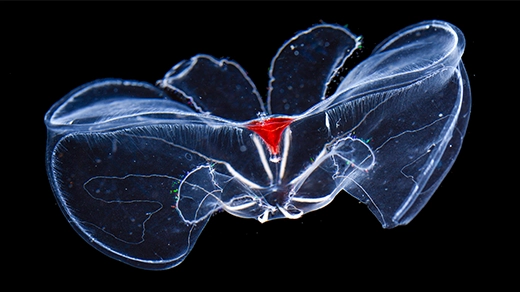What's up in
Oceans
Latest Articles
The Cellular Secret to Resisting the Pressure of the Deep Sea
Cell membranes from comb jellies reveal a new kind of adaptation to the deep sea: curvy lipids that conform to an ideal shape under pressure.
Deep Beneath Earth’s Surface, Clues to Life’s Origins
Last spring, scientists retrieved a trove of mantle rocks from underneath the Atlantic seafloor — a bounty that could help write the first chapter of life's story on Earth.
These Moons Are Dark and Frozen. So How Can They Have Oceans?
The moons orbiting Jupiter and Saturn appear to have subsurface oceans — tantalizing targets in the search for life beyond Earth. But it’s not clear why these seas exist at all.
How Quantum Physicists Explained Earth’s Oscillating Weather Patterns
By treating Earth as a topological insulator — a state of quantum matter — physicists found a powerful explanation for the movements of the planet’s air and seas.
What Causes Giant Rogue Waves?
Wave-science researcher Ton van den Bremer and Steven Strogatz discuss how rogue waves can form in relatively calm seas and whether their threat can be predicted.
An Explorer of Abyssal Depths Looks to Oceans on Other Worlds
The marine geochemist Chris German brings decades of experience studying seafloor hydrothermal vents to NASA’s preparations for visits to other ocean worlds in our solar system.
Random Search Wired Into Animals May Help Them Hunt
The nervous systems of foraging and predatory animals may prompt them to move along a special kind of random path called a Lévy walk to find food efficiently when no clues are available.
How Jurassic Plankton Stole Control of the Ocean’s Chemistry
Only 170 million years ago, new plankton evolved. Their demand for carbon and calcium permanently transformed the seas as homes for life.
Rapid Oxygen Changes Fueled an Explosion in Ancient Animal Diversity
Skyrocketing animal diversity a half-billion years ago was linked to spikes and dips in marine oxygen levels, according to a detailed geological study.








